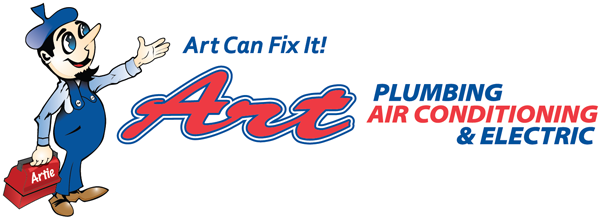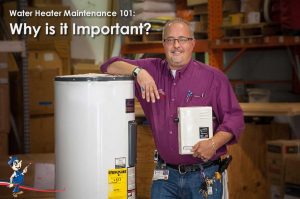Is Your Water Heater Quick To Run Out Of Hot Water?

No one wants to experience the frustration of having their water heater run out of hot water. You know that feeling when you’re enjoying a nice, hot shower and suddenly the water turns ice cold!
If you are experiencing this problem, you are in good company. Thankfully, most of these water heater issues can be resolved. In this guide by Art Plumbing, Air Conditioning & Electric, we will discuss what factors cause a water heater to run out of hot water and the solutions to this issue, so that you never run out again.
Water Heater Size
If you are experiencing a loss of hot water, it may be because the water heater is not big enough. If it is too small, it will be unable to supply hot water rapidly enough. The solution here would be to buy a larger unit so that the water temperature can regulate properly once again.
For small tanks, you may need to have a water heater of at least 40 gallons per minute. For medium tanks (40–100-gallon capacity), 50 gallons per minute is recommended and for large tanks, 75 gallons per minute should be enough for most homes.
Water Pressure
If your water pressure is too low or fluctuates wildly, it can lead to continuous run outs of hot water. A water pressure regulator that does not match the water heater can cause low water pressure. Living in an area with water shortages can also cause water pressure to drop.
To maximize efficiency and guarantee that your hot water never runs out, the water pressure should be set to 40 pounds per square inch. Always consult with an expert before adjusting this setting as there are many factors that can contribute to running out of hot water.
Heater Tank Insulation
If water heaters are not properly insulated, they will lose heated water to the exterior. This water will cool and then return to the heater. This can result in a water heater that is constantly running out of hot water.
Insulation can be installed on the tanks to ensure that the water inside is always at a high temperature and never runs out. This will also help with heating costs, so it’s worth considering!
Note, in order for tank insulation to be effective, it should be wrapped around at least 90% of the outer surface area of the storage tanks on all sides. Tank insulating blankets are often used but they must make proper contact with each side of the water heater.
A qualified professional can help you determine if your insulation needs replacing or adding onto so that this problem does not occur again!
Dirty Heater Elements
In order to prevent water from running out too quickly, make sure that all elements in the tank are cleaned and functioning well.
The three types of heating mechanisms found in water heaters include electric resistance elements (Enerlites), gas burners (vaporizing-type), and hot surface ignition devices. When these components accumulate sediment or rust particles over time, they can no longer effectively generate enough BTUs for an adequate shower temperature.
An electric water heater will need to be cleaned every year or so and a gas water heater should be cleaned once every three years.
Even if there is no sign that filters have become dirty yet, it may still be necessary to replace them periodically as they lose their ability to filter out particles over time. Naturally, this results in dirtier water and less efficient performance from appliances including water heaters.
Excessive Demand for Hot Water
Another simple reason for your water heater losing hot water is that too many people are using the same water heater at once. Taking frequent, long showers or multiple people showering at once will result in running out of hot water quickly.
If you’re sharing a tank with a family or roommates, try to stagger showers or other activities when possible. Another way to avoid these issues is to take shorter showers.
Clogged Water Heater Vent
If the water heater vent is clogged it can lead to a loss of hot water or cause excessive water flow and high energy usage because of the increase in water temperature that results from increased gas use.
To ensure that your water heater runs smoothly and doesn’t lose any heat prematurely due to improper ventilation, make sure there are no obstructions in front of the vents on top of the tank or near them at ground level. This includes things like dirt, leaves, grassy overgrowth etc., which could interfere with proper airflow into your furnace cabinet’s venting system.
Thermostat Settings
Your water heater may also be running out of hot water because the thermostat isn’t set properly. If it is set too high, it will run out of hot water quicker. If you find that the water coming out of your showerhead feels very warm or if there’s a lot of room-temperature air mixing in with the stream, this could be an issue
If the water temperature is set too high, it will run out quickly, and if the water temperature is set too low then you may not have adequate hot water.
The optimal water heater thermostat setting should be 120 °F at the maximum or whatever feels comfortable to your touch. If water is running cold in a shower, then this might be your issue!
Plumbing Issues
Plumbing problems can also affect how quickly a water heater runs out of hot water. When water is not flowing to the heater, it will run out quickly. If water flow slows down or stops completely, you may run out of hot water quicker than usual because there isn’t enough water for continuous heating of the tank.
Old pipes in your home may also contribute to a lack of hot water, even if the water heater is functioning properly. Older plumbing systems have less insulation and could be more likely to leak when exposed to higher temperatures.
This will result in lower water pressure and potentially an increase in energy consumption because it takes longer for the tank to heat up enough before releasing heated water into the system. That means these issues could have you spending a lot more on utilities each month!
Leaks
Your water heater may have a leak that is affecting your hot water. Leaks can be caused by corrosion of water pipes below the heater. To determine if it is leaking, it’s important to keep an eye on water usage.
In addition, corrosion can cause the insulation around water pipes and water heaters to fall off, causing water loss or even fires when the wires come in contact with other metal objects. If you notice that your electricity bill has been increasing more than usual, this may be due to a leak.
Are You Running Out of Hot Water? Contact the Water Heater Experts
When properly maintained, a tank-type water heater can last 8 to 12 years. So, if your water heater is not doing its job, then contact the professionals at Art Plumbing, Air Conditioning & Electric. We are experienced and qualified in all things related to plumbing including repairs, replacements, and installations. Our experts will be able to help you with any questions or concerns that come up during the process.
Give us a call at 1-800-475-1504 or contact Art Plumbing, Air Conditioning & Electric online, and say goodbye to cold showers!








